October 5, 2020
For over 25 years, MEDASSET has monitored the conservation status of sea turtle habitats throughout the Mediterranean and advocated for legislation and measures to ensure their preservation against unsustainable and unplanned development. Greece hosts some of the most important sea turtle nesting beaches in the whole region, specifically for the endangered loggerhead sea turtle (Caretta caretta), so a great deal of our policy work focuses on Greece.
Greek government is “paving paradise”
In the Mediterranean, especially over the past six years, countries hit by the economic crisis look at coastal tourism and real estate development to help them recover economically. Together with Spain, Turkey and Cyprus, Greece is reshaping policies to attract investments and increase commercial activity. Far from preserving and promoting pristine coasts and rich biodiversity hot spots – an economically and environmentally viable development model – it is now encouraging the destruction of the country’s unique coastline.
The Greek Ministry of Finance proposed a draft law in late April 2014, allowing unrestricted exploitation of the country’s entire coast. Businesses and investors will be able to use the entire length of a beach, not only to put up temporary infrastructure such as umbrellas and sunbeds, but also for more permanent constructions to satisfy their broader operations. The approval for such constructions will be granted by the Minister of Finance only with little input from conservation authorities.
Greek coasts are already littered with unauthorized constructions for private or business use due to lack of law enforcement and coastal zone management over the past decades, damaging both the environment and the tourist destinations. The draft law legalizes these illegal constructions and allows new constructions to be erected just 10 metres from the shoreline, with no consideration of the ecosystem’s carrying capacity. The Ministry makes no mention of any procedure to ensure substantial impact assessment of these developments on the natural environment thereby ignoring existing national environmental law. It also disregards international and European practices and policies for the management and protection of the coastal zones, to which it has previously committed to.

Loggerhead turtle searches in vain for a place to nest. Photo: C. Yung
Turtle habitats at risk
The Ministry’s vision of coastal development at any cost, as expressed by this draft law, has particular implications for sea turtles. No reference or exception is made for protected areas, which means coastal constructions and unsustainable beach uses could be legitimised in some of the most important loggerhead nesting beaches in the entire Mediterranean, such as Kyparissia and Zakynthos. Let’s not forget the numerous other Greek beaches that do not belong to the protected area network, but host a handful of turtle nests every year. Through the unconditional development permitted by this law, the few but precious scattered nests may well be just reminiscence in the next decades. It is clear that this law will lead to nesting decline and irreversible habitat damage.
With this draft law, the legislator seems to ignore all warnings about climate change. Sea turtles are especially vulnerable to the effects of changing temperatures and rising sea levels (read more here) and their habitats in Greece are at high risk for coastal erosion. Scientists predict that sea turtles will shift their nesting patterns in response to diminished habitats but the building development allowed by this new law will deprive them of any suitable alternative nesting beaches. The Ministry should instead be taking appropriate action to minimise the effects of climate change by locating the building zone further inland.
In essence, the proposed law will not only undermine Greek conservation efforts to date, but also the Mediterranean-wide efforts to conserve the species, which, given the migratory nature of turtles, is a shared responsibility of all Mediterranean nations.
A nationwide campaign to save the Greek coasts
More than 150,000 Greek citizens have already signed an e-petition against the draft bill. This massive outcry is supported by the scientific community, independent authorities, environmental organisations, architects, and academia among others. Despite the reaction, in June 2014, articles in the Press reported that the Ministry will submit the draft law to the Parliament for voting with few significant amendments.
MEDASSET took an active part in the public consultation process of the draft bill, by submitting comments and objections, and by writing to the Greek Minister asking for its withdrawal. We have joined other Greek environmental NGOs in a common effort to stop the government’s plans to fast-track unsustainable coastal exploitation. We support citizen and grassroots initiatives, such as a common e-action on World Oceans Day on 8 June, and on 9 July we joined Greek actor and marathon runner Agis Emmanouil as he ran 240 km along the coast of Athens to raise awareness and inspire action. We also brought the issue to the attention of the European Commission, the Barcelona Convention and the Bern Convention which are the international authorities responsible for the conservation of Mediterranean coasts and its rich biodiversity.
We will continue fighting for sustainable coastal development that can ensure long-term job creation and economic prosperity for the country, while preserving Greece’s unique biodiversity and the amazing coastal ecosystems and clean waters that attract thousands of visitors from around the world each year.
How you can help
- Sign the petition
- Share
- Support MEDASSET
Learn more:
Read about our advocacy activities in Greece
Get the big picture, read our article ‘Economic Recovery Takes Its Toll on Mediterranean Loggerheads’



Comments are closed.